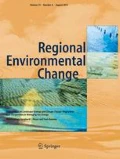Abstract
Long-term ecological research (LTER) has a strong foundation in the fields of biogeosciences and ecosystem research with infrastructures established in the nineteenth (e.g., 1891—Plön, Germany; 1840—Rothamsted, England) and twentieth centuries (e.g., 1906—Lunz, Austria; 1925—Trout Lake Station, WI, USA; 1955—Hubbard Brook, NH, USA; 1960—Solling, Germany). Over time, it has been repeatedly shown that the long-term study of processes has the potential to significantly improve ecological understanding at the ecosystem or larger scales. The international network of LTER sites (ILTER) was established in 1993 and included 28 countries by the turn of the millennium. The geographical spread of LTER sites across the globe has significantly increased since then, and by 2016, 44 countries have established formal LTER programs with approximately 800 LTER sites and 70 Long-term Socio-ecological Research (LTSER) platforms as part of the international network. Stimulated by the World Summit on Sustainable Development and the UN Convention on Biodiversity, research topics at ILTER sites have diversified considerably. Scientists started to address societal processes driving environmental change, as well as feedbacks of environmental changes on society. Furthermore, biodiversity research became an intrinsic part of LTER in many countries initializing the establishment of research infrastructures in ecosystems not yet included (e.g., caves, marine habitats). In October 2016, the ILTER Open Science Meeting in the Kruger National Park, South Africa, gave an impressive overview of the diversity of LTER across the globe today. With this special issue, we aim to present the broad range of research currently conducted across the ILTER network with a collection of papers from different continents and with research topics both classical to LTER and emerging fields of contemporary LTER.
Similar content being viewed by others
References
Curcoll R, Camarero L, Bacardit M, Àgueda A, Grossi C, Gacia E, Font A, Morguí J-A (2018) Evaluation of the representativeness and the causes of variability of atmospheric carbon dioxide observations at two sites of the Aigüestortes Long-Term Ecological Research node in Central Pyrenees, Spain. Reg Environ Chang. https://doi.org/10.1007/s10113-018-1443-2
Dick J, Orenstein DE, Holzer JM, Wohner C, Achard AL, Andrews C, Avriel-Avni N, Beja P, Blond N, Cabello J, Chen C, Diaz-Delgado R, Giannakis GV, Gingrich S, Izakovicova Z, Krauze K, Lamouroux N, Leca S, Melecis V, Miklos K, Mimikou M, Niedrist G, Piscart C, Postolache C, Psomas A, Santos-Reis M, Tappeiner U, Vanderbilt K, Van Ryckegem G (2018) What is socio-ecological research delivering? A literature survey across 25 international LTSER platforms. Sci Total Environ 622-623:1225–1240. https://doi.org/10.1016/j.scitotenv.2017.11.324
Figueroa-Rangel BL, Olvera-Vargas M (2018) Long-term responses of mountain forests to environmental change in West-Central Mexico. Reg Environ Change. https://doi.org/10.1007/s10113-018-1435-2
García MB, Silva JL, Tejero P, Pardo I, Gómez D (2018) Tracking the long-term dynamics of plant diversity in Northeast Spain with a network of volunteers and rangers. Reg Environ Chang. https://doi.org/10.1007/s10113-018-1350-6
Germ M, Remec-Rekar Š, Gaberščik A (2018) Weather conditions and chlorophyll concentrations determine long-term macrophyte community dynamics of Lake Bohinj (Slovenia). Reg Environ Chang. https://doi.org/10.1007/s10113-018-1345-3
Gingrich S, Schmid M, Dirnböck T, Dullinger I, Garstenauer R, Gaube V, Haberl H, Kainz M, Kreiner D, Mayer R, Mirtl M, Sass O, Schauppenlehner T, Stocker-Kiss A, Wildenberg M (2016) Long-term socio-ecological research in practice: lessons from inter- and transdisciplinary research in the Austrian Eisenwurzen. Sustainability 8:743. https://doi.org/10.3390/su8080743
Haase P, Tonkin JD, Stoll S, Burkhard B, Frenzel M, Geijzendorffer IR, Häuser C, Klotz S, Kühn I, McDowell WH, Mirtl M, Müller F, Musche M, Penner J, Zacharias S, Schmeller DS (2018) The next generation of site-based long-term ecological monitoring: linking essential biodiversity variables and ecosystem integrity. Sci Total Environ 613-614:1376–1384. https://doi.org/10.1016/j.scitotenv.2017.08.111
Haberl H, Winiwarter V, Andersson K, Ayres R, Boone C, Castillo A, Cunfer G, Fischer-Kowalski M, Freudenburg WR, Furman E, Kaufmann R, Krausmann F, Langthaler E, Lotze-Campen H, Mirtl M, Redman CL, Reenberg A, Wardell A, Warr B, Zechmeister H (2006) From LTER to LTSER: conceptualizing the socio-economic dimension of long-term socio-ecological research. Ecol Soc 11:13. http://www.ecologyandsociety.org/vol11/iss2/art13/
Hobbie JE, Carpenter SR, Grimm NB, Grosz JR, Seastedt TR (2003) The US long term ecological research program. BioScience 53:21–32. https://academic.oup.com/bioscience/article/53/1/21/227145
Mirtl M, T. Borer E, Djukic I, Forsius M, Haubold H, Hugo W, Jourdan J, Lindenmayer D, McDowell WH, Muraoka H, Orenstein DE, Pauw JC, Peterseil J, Shibata H, Wohner C, Yu X, Haase P (2018) Genesis, goals and achievements of long-term ecological research at the global scale: a critical review of ILTER and future directions. Sci Total Environ 626:1439–1462. https://doi.org/10.1016/j.scitotenv.2017.12.001
Pipan T, Petrič M, Šebela S, Culver DC (2018) Analyzing climate change and surface-subsurface interactions using the Postojna Planina cave system (Slovenia) as a model system. Reg Environ Chang. https://doi.org/10.1007/s10113-018-1349-z
Swemmer AM, Mashele M, Ndhlovu PD (2018) Evidence for ecological sustainability of fuelwood harvesting at a rural village in South Africa. Reg Environ Chang. https://doi.org/10.1007/s10113-018-1402-y
Thomas Z, Rousseau-Gueutin P, Abbott BW, Kolbe T, Le Lay H, Marçais J, Rouault F, Petton C, Pichelin P, Le Hennaff G, Squividant H, Labasque T, de Dreuzy J-R, Aquilina L, Baudry J, Pinay G (2018) Long-term ecological observatories needed to understand ecohydrological systems in the Anthropocene: a catchment-scale case study in Brittany, France. Reg Environ Chang. https://doi.org/10.1007/s10113-018-1444-1
Trajanov A, Spiegel H, Debeljak M, Sandén T (2018) Using data mining techniques to model primary productivity from international long-term ecological research (ILTER) agricultural experiments in Austria. Reg Environ Chang. https://doi.org/10.1007/s10113-018-1361-3
Acknowledgements
We would like to thank all those who made this special issue possible: the authors and their funders, the Editor in Chief of Regional Environmental Change, and the reviewers.
Author information
Authors and Affiliations
Corresponding author
Additional information
Publisher’s Note
Springer Nature remains neutral with regard to jurisdictional claims in published maps and institutional affiliations.
Rights and permissions
About this article
Cite this article
Dirnböck, T., Haase, P., Mirtl, M. et al. Contemporary International Long-Term Ecological Research (ILTER)—from biogeosciences to socio-ecology and biodiversity research. Reg Environ Change 19, 309–311 (2019). https://doi.org/10.1007/s10113-018-1445-0
Received:
Accepted:
Published:
Issue Date:
DOI: https://doi.org/10.1007/s10113-018-1445-0




